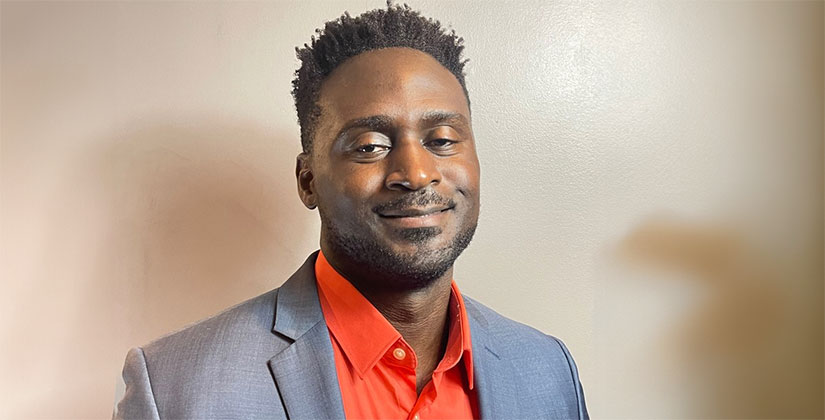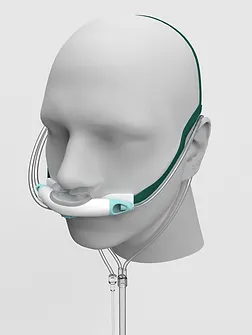Entrepreneur Spotlight: Tosan Ugbeye of Scopemed

For early-stage technology startups, it’s generally understood that failing fast is a prerequisite for future success. Startup founders must be prepared to learn from mistakes and iterate rapidly to adapt to changes in the market, technology or user needs.
Tosan Ugbeye, a registered clinician, certified anesthetist and the founder and CEO of ScopeMed, was working at a Level 1 trauma center at the outbreak of the COVID-19 pandemic. As health care professionals treated patients, Tosan witnessed the shock to the system of respiratory care protocols.
“There was a sudden, huge concern about how providers were going to safely care for their patients that presented with COVID,” Tosan explains. “As professionals, we didn’t know what to do.”
While hospital systems and clinics struggled to respond to the new, highly contagious virus, Tosan had an idea that formed the foundation of his startup. There was a device he used in his day-to-day work as a clinician—an anesthesia mask—that, with a few improvements to both the technology and hardware, could be adapted and used to keep both patients and providers safe.
Tosan and his team worked quickly to redesign the traditional oxygen mask, retrofitting it with modular technology for innovative oxygen delivery. But when he started fundraising about a year ago, Tosan realized that while the issue of COVID-19 mitigation and respiratory particle transmission was still top of mind in his field, it wasn’t a priority for investors or other stakeholders anymore.
At a crossroads, Tosan didn’t want to abandon his initial idea. But because the pandemic made the critical importance of respiratory health more obvious, he decided it was time to pivot.
“One of the biggest lessons that I’ve learned as a founder through my mentors is that you have to get away from the mindset that your startup is your baby,” Tosan says definitively.
In true entrepreneurial fashion, Tosan redirected his focus to the technology of High Flow Oxygen Therapy (HFOT), a specialized method of respiratory support that provides a precise mix of heated and humidified air with a high flow of oxygen.
Conventional oxygen therapy, which is administered to patients as they recover from surgeries and other procedures, is readily available but not very effective during respiratory distress, like the patients with COVID he treated during the pandemic. Tosan is now working on how the benefits of HFOT—better oxygenation, improved patient comfort and reduced breathing effort—could assist those with chronic respiratory problems like COPD and sleep apnea.

Born and raised in Nigeria, Tosan says it was his mother who always had the entrepreneurial spirit. As a single mom raising two kids, she made clothes and other goods to sell on the side for extra income. His family moved to Canada in 2004 and by the time he arrived in Cleveland in 2012, he was intrigued with Silicon Valley and tech startup company culture and it wasn’t long before he was enrolled in business school through Cleveland State University (CSU).
As a CSU student, Tosan was taking an entrepreneurship class when he first was introduced to Northeast Ohio’s tech ecosystem. When he launched MedScope, he became actively engaged with JumpStart and Bounce Innovation Hub, where he was able to gain valuable advice and connections to experts that guided the early stages of this idea.
Tosan credits his advisors for pushing him to into the right space and helping him recognize the need to pivot when his initial fundraising efforts weren’t gaining traction.
“Their advising sessions are always exponential learning opportunities, but they grill you,” he says with a smile. “They don’t hold back telling you what’s not going to work. They don’t mince words.”
Tosan recently delivered the winning pitch at FastStart HealthTech Accelerator, a 12-week program for pre-seed/seed stage health tech companies that JumpStart ran in conjunction with LifeX, a Pittsburgh-based health tech accelerator. Tosan says the additional clarity he received in the program shaped the structuring of ScopeMed’s business model to position the company not only for immediate success with investors but sustained growth in line with long-term goals.
“There’s no way I could have done this by myself,” Tosan admits. “I may have an MBA, but that does not teach you how to take an idea to a prototype and then to market and customer validation.”
For now, he is working half of the time with ScopeMed and half of the time as a clinician, and though he knows he will be transitioning to his startup full time soon, leaving his work in the hospital will be bittersweet.
“It’s highly skilled, very rewarding work,” Tosan says. “It’s going to be as hard to let go of that as it was to let go of my initial product.”
Tosan is focused on fundraising and gathering clinical data based on information he picked up during the accelerator. His team at ScopeMed is busy working on prototypes and prioritizing the integrated components necessary to launch a pilot study in the coming months.